begin quote from:
In his own words, how Donald Trump sees himself
CNN11 hours agoMoments Trump Has Come Under Fire Over Comments About Women
ABC News6 hours agoA Few Times Donald Trump Said ‘You’re Fired’
ABC News2 days ago2016 Election
How Donald Trump sees himself
Story highlights
- CNN looked at Trump's writing, speeches and interviews over 30 years
- His outlook: 'I always get even'
(CNN)He considers himself a member of "the lucky sperm club."He trusts no one, and places a premium on revenge. ("If you do not get even, you are just a schmuck!")He treats every decision he makes "like a lover," sometimes thinking with his head, other times with other parts of his body, because it reminds him to "keep in touch with my basic impulses."And to make creative choices, he writes: "I try to step back and remember my first shallow reaction. The day I realized it can be smart to be shallow was, for me, a deep experience."This is Donald J. Trump as he sees himself and the world.CNN scoured thousands of pages of books, speeches, profiles and television interview transcripts from the past three decades to stitch together a portrait based entirely on the Republican presidential front-runner's own words.Taken together, his words offer further insight into the leadership style of the billionaire-turned-politician, whose extraordinary candidacy has simultaneously electrified and repulsed large swaths of the electorate.The GOP candidate has relentlessly mocked his opponents, lashed out at reporters and scorned the status quo. He has trusted his instincts, refused to apologize amid controversy, stood by his allies and sought to destroy his foes. He has focused on the big picture ("Make America Great Again") rather than on details such as abortion policy.Trump authored more than a dozen books about his experiences in the business world that shaped this outlook -- most of them self-help treatises with titles including the 1987 best-seller "The Art of the Deal," 2004's "Think Like a Billionaire: Everything You Need to Know About Success, Real Estate, and Life," and 2007's "Think Big."Related: I'm voting for Donald Trump
On the campaign trail, Trump has brushed off questions about his temperament, his leadership style and how he would govern. He has derided the press as being "among the most dishonest people ever created by God" — insisting that reporters have gotten his story wrong time and again.Trump himself has shared his story in detail. Some recurrent themes in his writings include strength, success, self-confidence, distrust and revenge. He has often written and spoken about what he sees as the decline of the United States, a bedrock theme of his presidential campaign."The world is a vicious and brutal place, he wrote in "Think Big." "Even your friends are out to get you: They want your job, they want your house, they want your money, they want your wife, and they even want your dog.''"When people wrong you, go after those people, because it is a good feeling and because other people will see you doing it," he writes. "I always get even."













'If I had been the son of a coal miner'
Trump's life story, in the broadest of brush strokes, goes like this:He was born the son of wealthy New York real-estate developer Fred C. Trump. He went to a private military academy in high school, attended Fordham for two years, then the Wharton School of Finance from which he graduated.While his father did business in Brooklyn and Queens, Trump set off to make his mark in Manhattan. He became fabulously wealthy (think penthouse, helicopter, yacht, private plane) in the real estate boom of the '80s, then nearly lost it all when the boom went bust. He has since rebounded to the tune — he says — of a personal fortune of $10 billion. (Forbes estimates his net worth at $4.5 billion).As he has run his empire and ascended as a mega star on reality TV, Trump has often been accused of being a bully, which he denies.He does, however, acknowledge being a "very assertive, aggressive kid."When he was in elementary school he formed the opinion that his music teacher didn't know much about music.So, Trump punched him in the face, he wrote in 1987's "The Art of the Deal.""In the second grade I actually gave a teacher a black eye," he wrote. "I'm not proud of that, but it's clear evidence that even early on I had a tendency to stand up and make my opinions known in a very forceful way. The difference now is that I like to use my brain instead of my fists." (He adds that he "almost got expelled" over the incident.)Another time, while playing with building blocks with his younger brother Robert, Trump ran out of blocks in the middle of a creation.
Related: Donald Trump has had too much media coverage, 75% of Americans say
He asked his little brother if he could borrow some of his. Yes, the brother said, as long as you give them back when you're done.The elder Trump completed his project and liked it so much that he glued the blocks together.It was a self-admiration that would carry over into his real life as a builder.In "Think Big," he writes of the emotional reaction he has when arriving to work at Trump Tower."I love to see the crowds of people oohing and aahing at the stunning marble and the breathtaking 80-foot waterfall," he wrote. "In truth I am dazzled as much by my own creations as are the tourists and glamour hounds that flock to Trump Tower ... or any of my other properties."The mutual admiration of his work, Trump wrote, makes him feel "a little closer to them even though we've never met."The billionaire developer has long felt a kinship with blue-collar workers -- and he believes the feeling is reciprocated. There is without question an aspirational nature to his candidacy, and blue-collar workers have shown up at the polls in droves to support his bid for the Republican nomination — often expressing admiration for his success and a belief that his financial wealth will free him from the influence of special interests if he makes it to the White House."Rich men are less likely to like me," Trump told Playboy in a 1990 interview, "but the working man likes me because he knows I worked hard and didn't inherit what I've built."Trump acknowledges he was born wealthy — he grew up in a 23-room house in the Jamaica Estates section of Queens — and that his father loaned him money to begin his own business. But he stresses that he set himself apart when he headed to Manhattan and began building skyscrapers instead of affordable rental units."I often say that I'm a member of the lucky sperm club," he wrote in 2009's "Think Like A Champion.""But did it give me a natural talent? I don't think so. It gave me an advantage that I deliberately chose to develop into an advantage."There is an "it" factor people like him are born with, Trump has said.To explain what he meant by "it," Trump, the son of a multi-millionaire, evoked the plight of mine workers with black lung disease in the interview with Playboy."If I had been the son of a coal miner I would have left the damn mines," said Trump, then 43. "But most people don't have the imagination—or whatever — to leave their mine.""They don't have 'it,' " he said.Moments of self-reproach
Trump seems most self-critical when writing about the near collapse of his real-estate empire in 1990."In the early 90s I was in a ton of debt. I had gone from the smartest guy in town to a complete zero," he wrote in 2007's "Think Big." "I went from being a super genius to a moron."He recalled walking down the street one day with his then-wife, Marla Maples, and reflecting on his situation. He pointed to a nearby man."That beggar over there is worth $900 million more than I am," he wrote."What do you mean?" Maples asked."Because I'm $900 million in debt," he replied, "and at least he has money in his pocket."He attributed his fall not only to the revision of the tax code by Congress in 1986 — which he said destroyed "just about any incentive anyone might have for investing in real estate" — but also to his own complacency.Related: 10 Trump flip flops
"I got a little cocky, and probably, a little bit lazy," he wrote in 1997's "The Art Of The Comeback.""You just get a feeling of invincibility," he said, reflecting on his downward spiral in that book."You let down your guard. You don't work as hard. Then things start to go in the wrong direction."Trump, who has written that he sleeps three-to-four hours a night so he can devote as much time as possible to his work, does not dwell on his misfortune on the campaign trail, except to establish the depths from which he re-emerged.He threatened to sue a Washington Post reporter who wrote about the bankruptcy of the Taj Mahal, one of his casinos in Atlantic City, according to an interview with that reporter on NPR's "Fresh Air." Trump also reacted indignantly to a question about his bankruptcies during CNN's September debate last year, insisting that he merely took advantage of U.S. laws to help his business.Getting even
Back on top in the mid-2000s, Trump wrote "Think Big," which shows the evolution of his management style and his values as a leader."DO NOT TRUST ANYONE," reads one chapter subheading."I used to say, 'Go out and get the best people, and trust them.' Over the years I have seen too many shenanigans, and now I say, 'Get the best people and don't trust them.'"Another maxim in Trump's world is revenge."I always get even," he writes in a chapter dedicated to the subject.How to throw shade like Donald Trump
To illustrate his point, he tells of a woman "making peanuts" in her government job before Trump recruited her to work for him in the 1980s."She was a nobody in her government job and going nowhere," Trump wrote of the unnamed woman. "I decided to make her into somebody."Under his mentoring, Trump wrote, the woman became powerful in real estate and bought a beautiful home.When Trump was under intense financial pressure in the early '90s, he asked the woman to make a phone call to "an extremely close friend of hers who held a powerful position at a big bank who would have done what she asked."So Trump "got rid of her," he wrote."She ended up losing her home. Her husband, who was only in it for the money, walked out on her and I was glad," he continued. "Over the years many people have called asking for a recommendation for her. I only give her bad recommendations. ...This woman was very disloyal, and now I go out of my way to make her life miserable."Trump punctuated the anecdote with several bullet points at the end of the chapter, including:"When somebody screws you, screw them back in spades" and "Go for the jugular so that people watching will not want to mess with you."That approach was shaped by his own travails in business in the early 1990s as he watched his empire collapse around him."I believe in an eye for an eye — like the Old Testament says," he wrote in "The Art of the Comeback.""Some of the people who forgot to lift a finger when I needed them, when I was down, they need my help now, and I'm screwing them against the wall. I'm doing a number.... And I'm having so much fun."The politics of Trump
While Trump's writings and statements are geared primarily toward the business world, he has routinely weighed in on politics over the years.Favorite themes are the need for national strength and restoring America's stature abroad, which he says has been diminishing for decades.In the Playboy interview, he referred to the 1989 pro-democracy movement in Beijing's Tiananmen Square in which some 10,000 government troops killed an unknown number of protestors."When the students poured into Tiananmen Square, the Chinese government almost blew it," Trump said. "Then they were vicious. They were horrible, but they put it down with strength. Our country is right now perceived as weak ... as being spit on by the rest of the world."In "Think Big," he criticized then-Secretary of State Condoleezza Rice as a smiling, waving lightweight who is no match for the murderous dictators she was dispatched to deal with."Condi Rice just goes over there to get her picture taken," Trump wrote.Trump states without equivocation that he could accomplish a feat that has eluded politicians for decades:"I could negotiate peace in the Middle East -- very few other people could," he wrote in "Think Big."Aside from a brief flirtation with the idea of a presidential bid in 2000, however, Trump has spent most of his years in the spotlight denying or downplaying such aspirations."I think I'm almost too honest to be a politician," he told CNN in 1997."I'm too forthright. I'm too — I think I'm too honest," he said, "but I do believe I'm too forthright to be a politician."
To the best of my ability I write about my experience of the Universe Past, Present and Future
Top 10 Posts This Month
- Trump to make announcement with Hegseth on shipbuilding from Mar-a-Lago
- Here's how much ACA premiums would have risen this year without tax subsidies:
- How the global food system is impacting obesity and climate change: Study
- quote from Wikipedia: Mark Carney
- gold has surged 70% since the Start of the Year
- As storms inundated Washington state, federal grants for flood mitigation work sat on hold
- Deputy AG says removing photos from Epstein files has 'nothing to do' with Trump(Sure thing) (ha ha)
- reprint of: My Path to Enlightenment from 2011
- is the storm hitting California a pineapple express?
- What is the main weakness of a Subaru 2017 PZEV engine: The Oil Seals and Gaskets. Why? (Part 2)
Friday, April 1, 2016
In his own words, how Donald Trump sees himself
Subscribe to:
Post Comments (Atom)











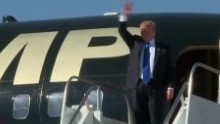






















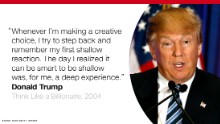






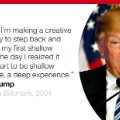
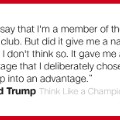
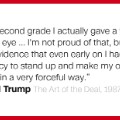
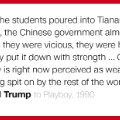
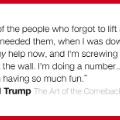
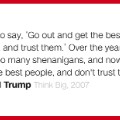
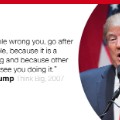
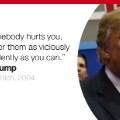
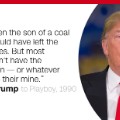
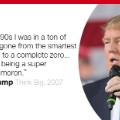
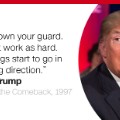
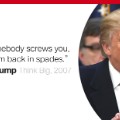
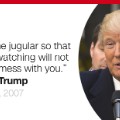
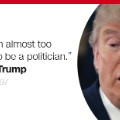


No comments:
Post a Comment